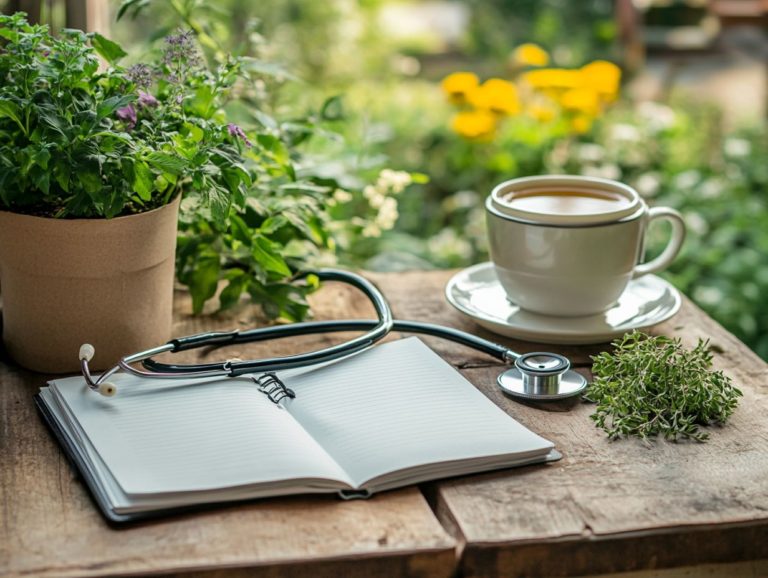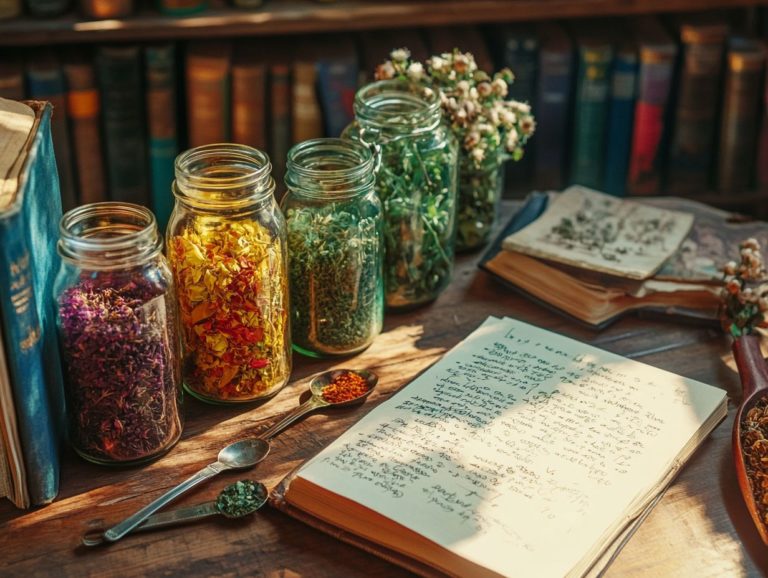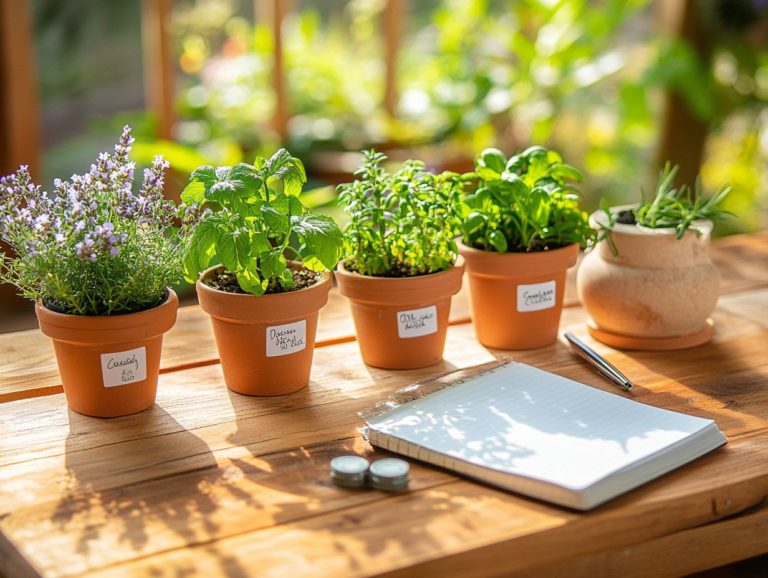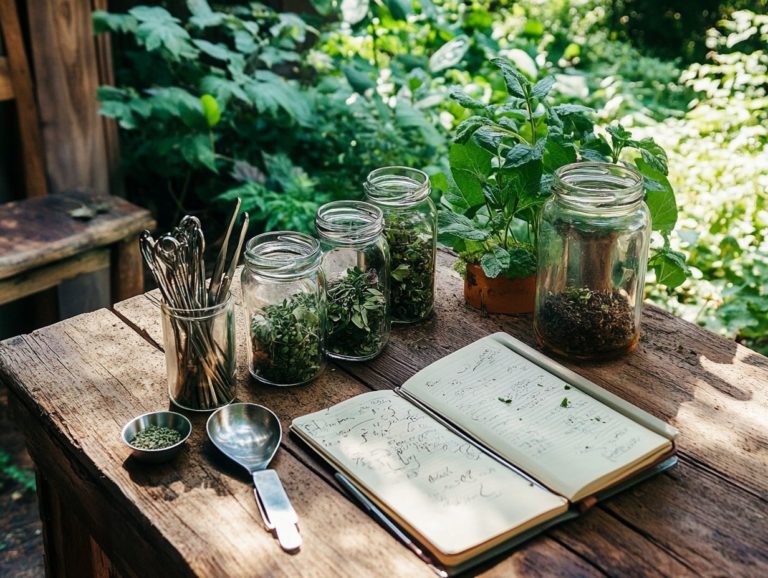The Effects of Combining Herbs on Dosage Safety
Herbs have held a place of esteem for centuries, celebrated for their therapeutic properties and offering a natural pathway to health and wellness.
Grasping the nuances of their effects, particularly when blended with other herbs, is essential for ensuring both safety and effectiveness in your use.
This article delves into the fundamentals of herbs, emphasizing the significance of proper dosage and the potential risks that arise from combining various herbs. You ll uncover safe pairing strategies and vital guidelines that will empower you to harness their benefits while safeguarding your health.
Contents
- Key Takeaways:
- Understanding Herbs and Their Effects
- The Importance of Proper Dosage
- Potential Risks of Combining Herbs
- Safe Combinations of Herbs
- Guidelines for Combining Herbs
- Frequently Asked Questions
- What are the potential risks of combining herbs for dosage safety, particularly regarding chronic disease management?
- How can I ensure safe dosages when combining herbs?
- Are there any herbs that should not be combined for dosage safety?
- Can combining herbs affect the effectiveness of my prescription medications?
- What precautions should I take when combining herbs, especially for U.S. adults with chronic disease?
- Is it safe to combine herbs like echinacea and green tea extract with over-the-counter medications?
Key Takeaways:
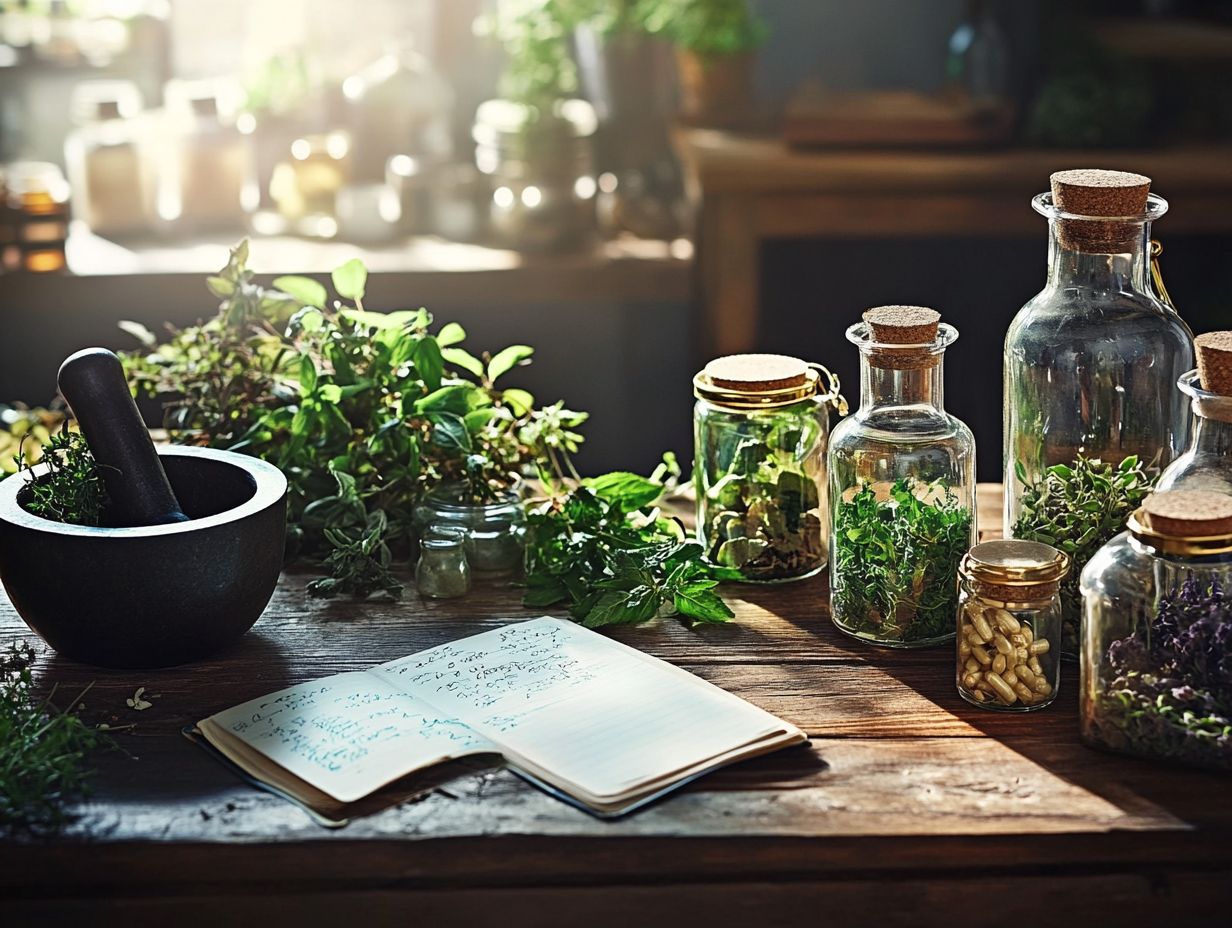
- Getting the dosage right is essential for safely enjoying the benefits of combined herbs.
- It’s important to understand potential interactions and side effects of herb combinations to minimize risks.
- Following guidelines and considering factors such as individual health and dosage forms can help create safe and effective herb combinations.
Understanding Herbs and Their Effects
Understanding herbs and their effects is essential for you, especially as the popularity of dietary and herbal supplements continues to rise among adults in the U.S., particularly those managing chronic diseases.
Herbs like American ginseng, St. John s wort, black cohosh, ginkgo biloba, goldenseal, curcumin, echinacea, and milk thistle have been embraced across cultures for their purported health benefits. However, it s crucial to grasp how these natural remedies interact with prescription medications and with each other.
Knowing this can make a huge difference in your health journey!
Unlocking the Power of Herbs: What You Need to Know
Herbal supplements such as American ginseng, echinacea, curcumin, and milk thistle offer a wide array of benefits, from enhancing immunity to promoting liver health. It’s essential for you to grasp their unique advantages and applications.
Take American ginseng, for example; incorporating it into your dietary routine can elevate your energy levels and bolster cognitive function. Research suggests that echinacea might even shorten the duration of colds, making it a handy ally during the sniffle season.
Curcumin, extracted from turmeric, boasts anti-inflammatory properties well-supported by numerous clinical studies, hinting at its potential in managing chronic conditions. On the other hand, milk thistle shines with its liver-protective benefits, and ongoing research is looking into its role in detoxification protocols.
By integrating these powerful supplements into your daily nutrition, you can effectively tap into their myriad benefits.
The Importance of Proper Dosage
Proper dosage is critical for ensuring both the effectiveness and safety of herbal dietary supplements. Misuse can lead to bad reactions with other medications and reduced therapeutic effects.
Clinical trials demonstrate that grasping the correct dosage of herbal supplements like American ginseng or St. John’s wort can profoundly influence their potential to support health while minimizing the risk of harmful side effects. Understanding the risks of improper herbal dosage is crucial for safe usage.
Why Dosage Matters
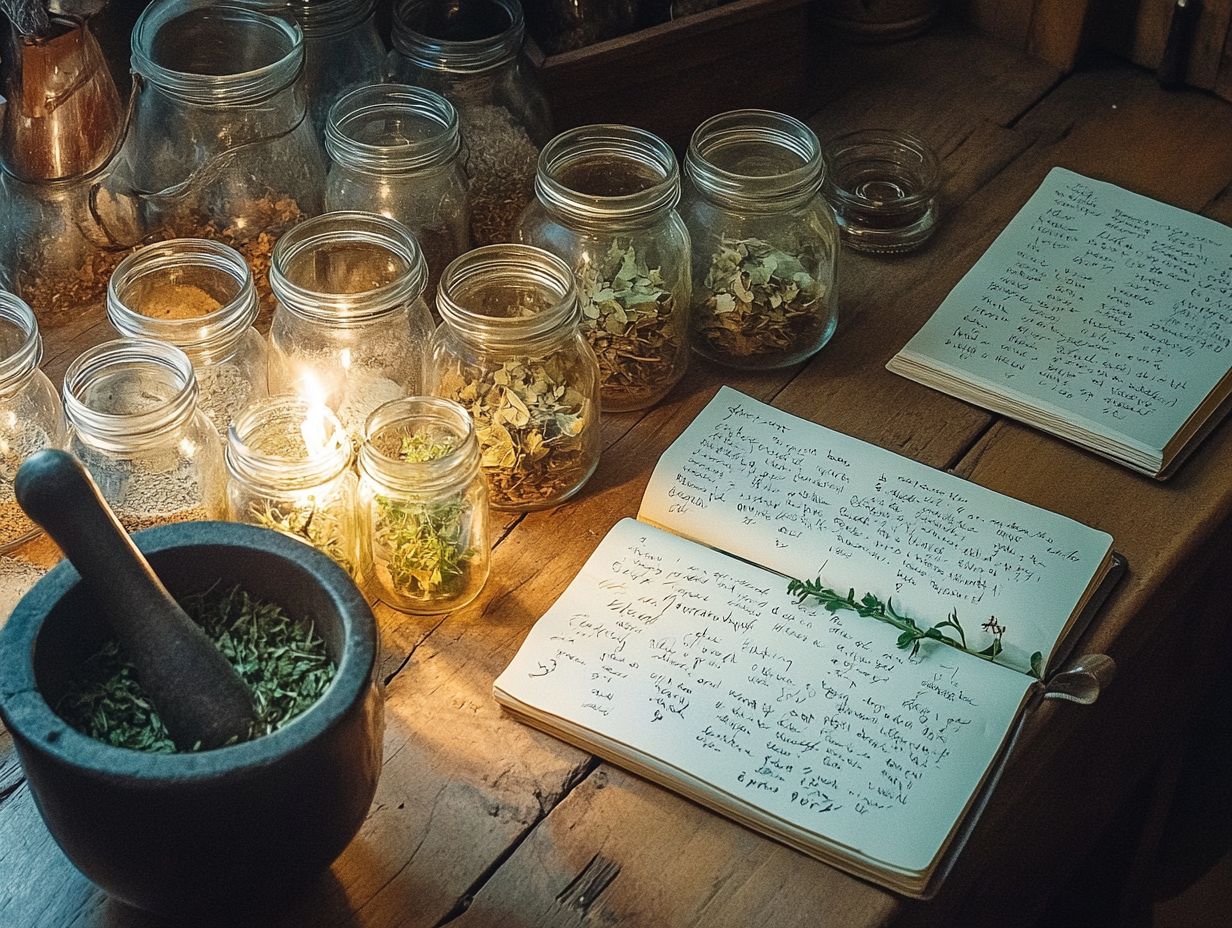
Dosage plays a crucial role when it comes to herbal supplements. Getting the right amount can significantly enhance their effectiveness while minimizing the risk of adverse interactions with prescription medications.
Understanding the precise dosage is essential; both underdosing and overdosing can lead to unintended consequences. For example, taking too little of an herb might yield minimal therapeutic effects, leaving you no better off than before. Conversely, exceeding the recommended amount could amplify side effects or create negative interactions with other drugs. To ensure safety when using herbs, consider following guidelines from creating herbal remedies: safety tips.
It’s wise to consult healthcare professionals to navigate these complexities. Striking the right balance in dosage, as outlined in herbal remedies: safe dosage for adults and children, not only maximizes the potential benefits of the herbs but also protects you from potential harm, fostering a holistic approach to your overall health.
Potential Risks of Combining Herbs
The risks of combining herbs should not be underestimated. Interactions between herbal supplements and prescription medications can lead to serious drug interactions.
It is crucial to understand how drugs move in your body and how they affect your body. This is especially important if you use herbal supplements like ginkgo biloba or goldenseal.
Knowing this is especially important if you take medications like warfarin. It helps you avoid adverse side effects that could jeopardize your health.
Possible Interactions and Side Effects
When combining herbal supplements like ginkgo biloba and goldenseal with prescription medications, be aware of potential interactions and side effects.
For instance, ginkgo biloba can inhibit platelet aggregation, raising the risk of bleeding when taken with blood thinners like warfarin.
Goldenseal might also affect how certain drugs are processed in your liver. This could lead to increased toxicity or reduce the effectiveness of your medication.
These interactions highlight the necessity of consulting healthcare professionals before introducing herbal remedies into your routine. Always prioritize your safety by discussing your options.
Engage in thoughtful discussions about all the supplements you are considering. This way, you can create an informed and safe approach to managing your overall health.
Safe Combinations of Herbs
Identifying safe combinations of herbs is crucial to maximize efficacy while minimizing potential adverse effects, especially if you’re incorporating herbal supplements into your health regimen.
Pairings like echinacea with goldenseal can offer significant benefits. Ensure that these combinations won t interfere with any existing treatments or trigger unwanted side effects.
Your health matters above all else! Making informed choices will help you navigate the herbal landscape with confidence.
Effective and Safe Pairings
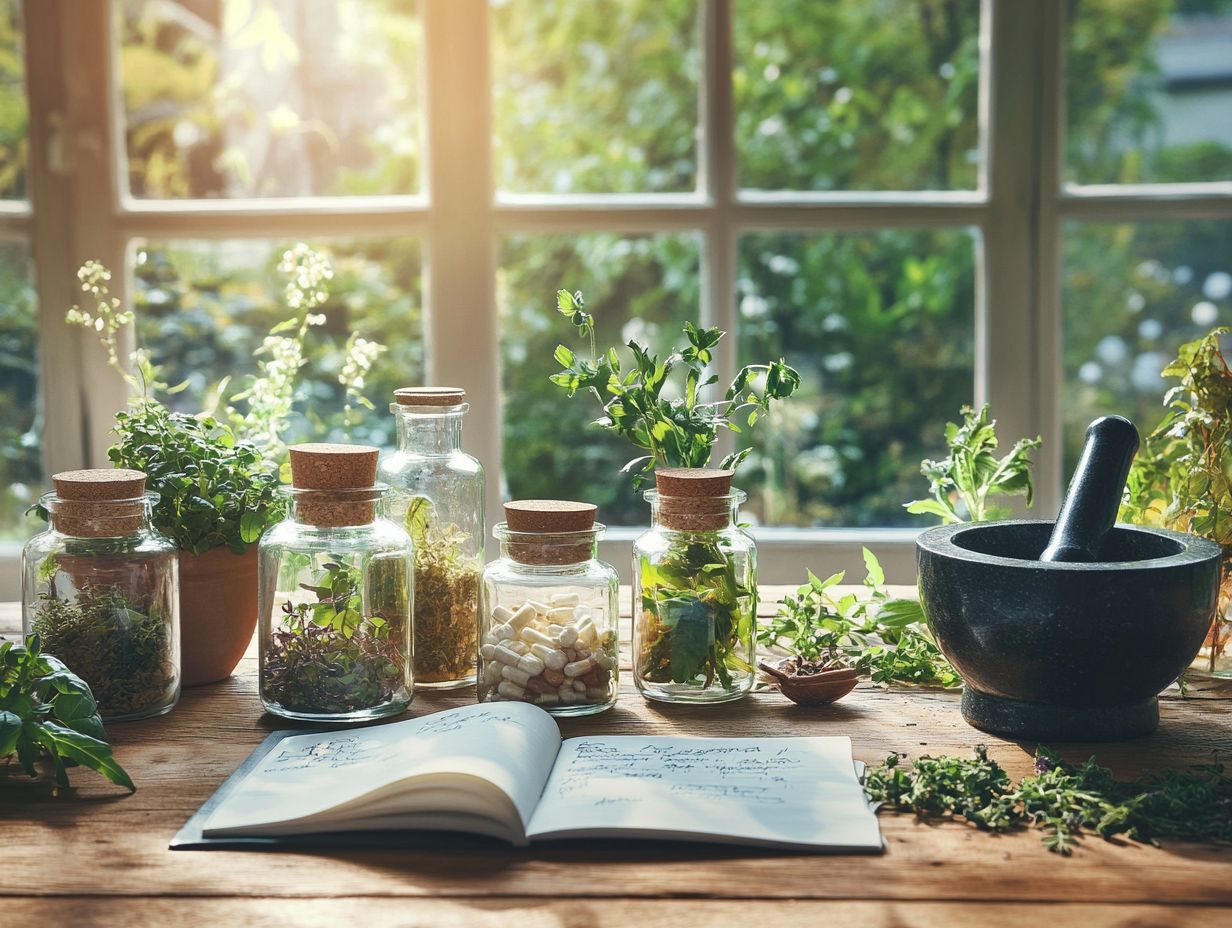
Effective and safe pairings of herbal supplements can significantly enhance their individual benefits while minimizing the risk of adverse interactions. It is essential to fully understand these combinations.
For example, when you combine ginger and turmeric, you create a powerhouse duo that reduces inflammation and boosts your immune function.
Similarly, blending chamomile with valerian root offers a natural remedy for improved sleep quality, harnessing the calming properties of both herbs.
These strategic combinations underscore the importance of synergy in herbal medicine. One herb can amplify the effects of another, leading to improved overall health.
By being well-informed about these complementary pairings, you can elevate your therapeutic outcomes and cultivate a deeper sense of well-being.
Guidelines for Combining Herbs
When combining herbal supplements, it is crucial to follow specific guidelines that prioritize safe dosages and effectiveness, especially if you are managing chronic conditions.
Consider factors such as your existing health issues and any current medications like warfarin. The potential for drug interactions is significant.
Engaging in thorough discussions with your healthcare provider will help you tailor the most suitable approach for your unique situation. Act now to safeguard your health!
Factors to Consider for Safe Dosage
When looking at the safe dosage of herbal supplements, consider your patient history and any chronic diseases you have.
Existing medications can also affect safety. Also, take into account your age and weight since these factors influence how your body processes substances.
Health conditions, especially liver or kidney disease, can significantly alter how your body reacts to supplements, which may lead to toxicity.
It’s crucial to watch for possible interactions with prescription medications. Some combinations might change how your treatments work.
A thorough health assessment is essential to customize the dosage appropriately, ensuring the supplements work effectively while remaining safe for you.
Frequently Asked Questions
What are the potential risks of combining herbs for dosage safety, particularly regarding chronic disease management?
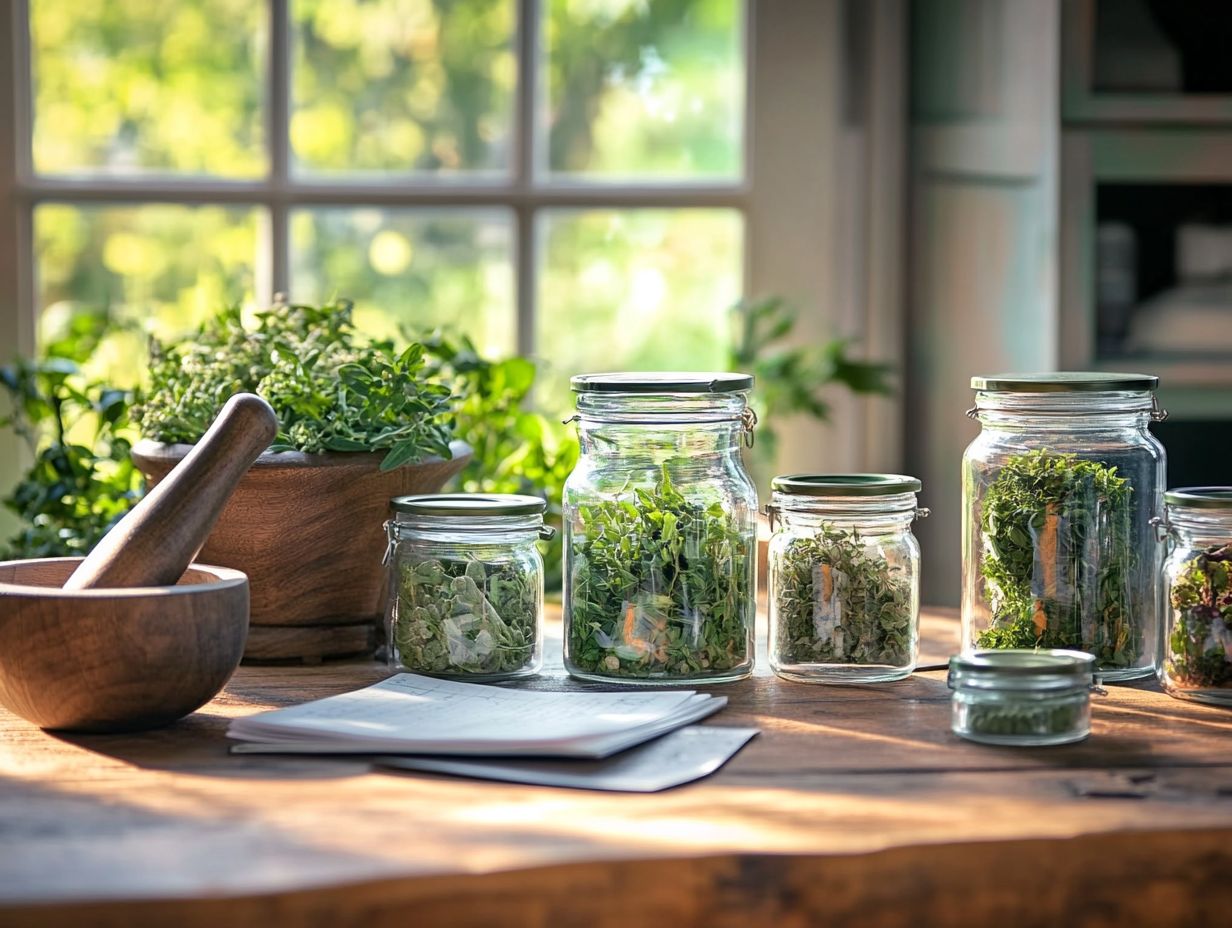
Combining herbs for dosage safety can pose several risks, including interactions between herbs and medications, incorrect dosage calculations, and increased risk of side effects.
How can I ensure safe dosages when combining herbs?
To ensure safe dosages when combining herbs, consult with a healthcare professional or a licensed herbalist. They can provide personalized recommendations based on your health history and current medications.
Are there any herbs that should not be combined for dosage safety?
Some herbs and herbal supplements, like St. John’s Wort with antidepressants or valerian with sedatives, should not be combined. Always research potential drug interactions before combining herbs.
Can combining herbs affect the effectiveness of my prescription medications?
Yes, some herbs, like garlic and ginkgo biloba, can increase or decrease the potency of certain medications, affecting their effectiveness or increasing side effects.
What precautions should I take when combining herbs, especially for U.S. adults with chronic disease?
Always start with small doses to stay safe and gradually increase if needed. Keep track of any changes in symptoms or side effects, and consult a healthcare professional if you have any concerns.
Is it safe to combine herbs like echinacea and green tea extract with over-the-counter medications?
Combining herbs with over-the-counter medications can be safe, but be cautious. Consult with a healthcare professional at trusted institutions like the National Center for Complementary and Integrative Health, as some herbs can interact with common OTC medications.

